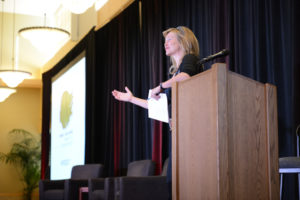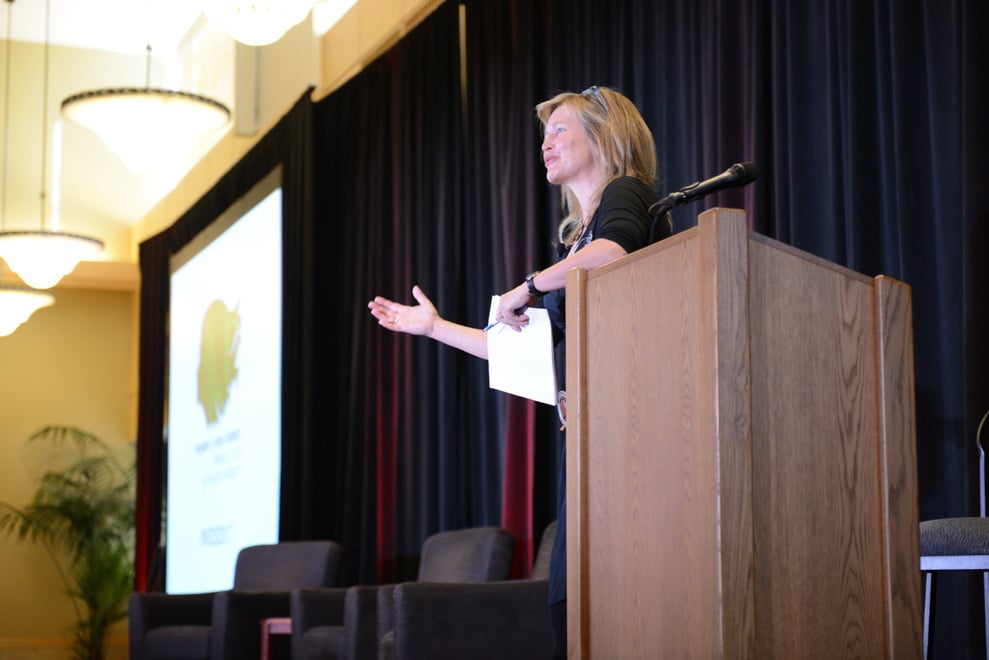Speakers at the Women in Data Science (WiDS) conference gave attendees insight into cutting-edge research in the data science industry last Friday.
This second annual conference was the result of partnerships between the Stanford Institute for Computational and Mathematical Engineering (ICME) and other technology-focused organizations. Margot Gerritsen, director of ICME and associate professor of energy resources engineering, presided over the conference with assistance from the event’s co-directors. According to its mission statement, the event, which is hosted at a number of locations worldwide, aims “to inspire and educate data scientists — regardless of gender — and support women in the field.”
Over the course of the day, the conference hosted a moderated fireside chat, two keynote addresses, a variety of “technical vision talks” and a career panel.

Last week’s Women in Data Science Conference drew speakers from the tech and business world and beyond.
The morning’s fireside chat featured Lori Sherer, a partner at Bain & Company, and Caitlin Smallwood M.S. ’93, vice president of science and algorithms at Netflix.
Smallwood discussed the applications and challenges of data analytics and algorithms at Netflix, noting that the greatest challenge in her role is less computational and lies in the interpretation of data given human factors.
“The area of being able to effectively communicate about data science is so valuable, particularly as algorithms get a little bit better since they are so opaque,” Sherer said.
The first set of technical vision talks was led by Miriah Meyer, assistant professor at the University of Utah, and Sinead Kaiya, COO for products and innovation at SAP. Meyer presented on the importance of data visualization, noting that “visualization is what brings the knowledge to bear and helps make decisions,” while Kaiya focused on the connection between global business and data science. Kaiya, who confessed that she is in actuality not a “data scientist” but has a degree in fine arts, concluded that the relationship between the two fields is at a tipping point, with business decisions needing to rely more on data.
The second set of technical vision talks ranged in topic from machine learning and artificial intelligence to human rights data.
Megan Price, executive director at Human Rights Data Analysis, presented about her organization and its practices, demonstrating how data can be exploited in pursuit of solutions to social inequity. One of Human Rights Data Analysis’s major roles is to provide expert testimony in court cases on the behalf of those whose rights have been violated. Their analysis is done through specific Python modules.
“We’re essentially the behind-the-scenes scientists for human rights advocacy organizations,” Price said. The conference continued with another keynote address given by Deborah Frincke, director of research at the National Security Agency (NSA).
Frincke opened with enthusiasm for the event’s focus on female participants before turning to present on the NSA’s three core missions of information assurance, foreign intelligence and cyber network operations. She was unable to answer where the organization drew most of its data from.
Harvard University assistant professor of computer science Finale Doshi-Velez gave one of the event’s final technical vision talks, emphasizing machine learning’s ability to boost health care and optimize treatments for conditions such as HIV. By combining different approaches to treatment and capitalizing on their complementary strengths, Doshi-Velez hopes to create accurate models for necessary treatments.
For Doshi-Velez, the application of machine learning research to help save lives goes beyond data.
“I am able to deliver the warm fuzzies that I really care about with cold hard numbers,” she said.
The third annual WiDS Conference will take place on Feb. 1, 2018.
Contact Caroline Kimmel at ckimmel ‘at’ stanford.edu.
